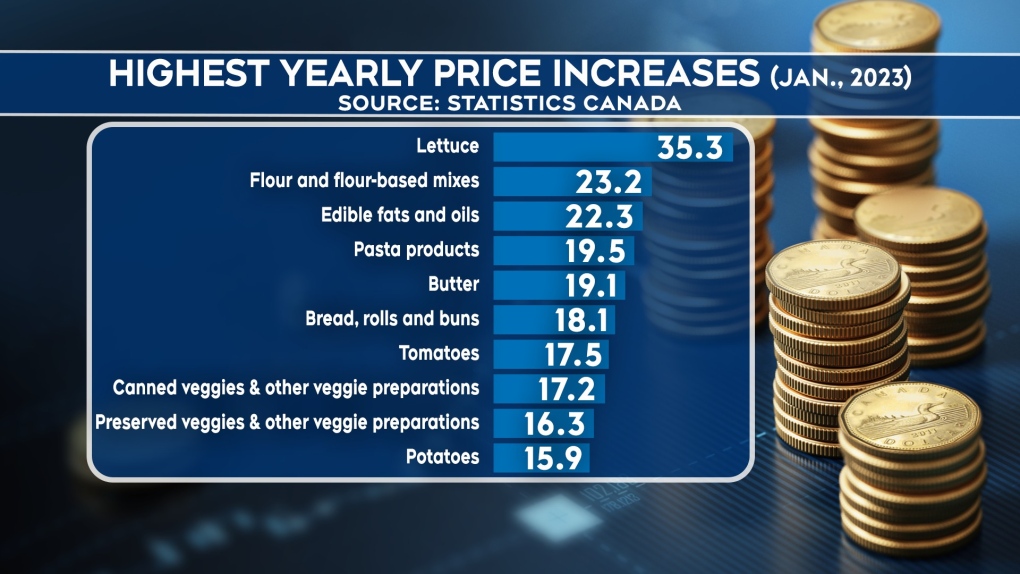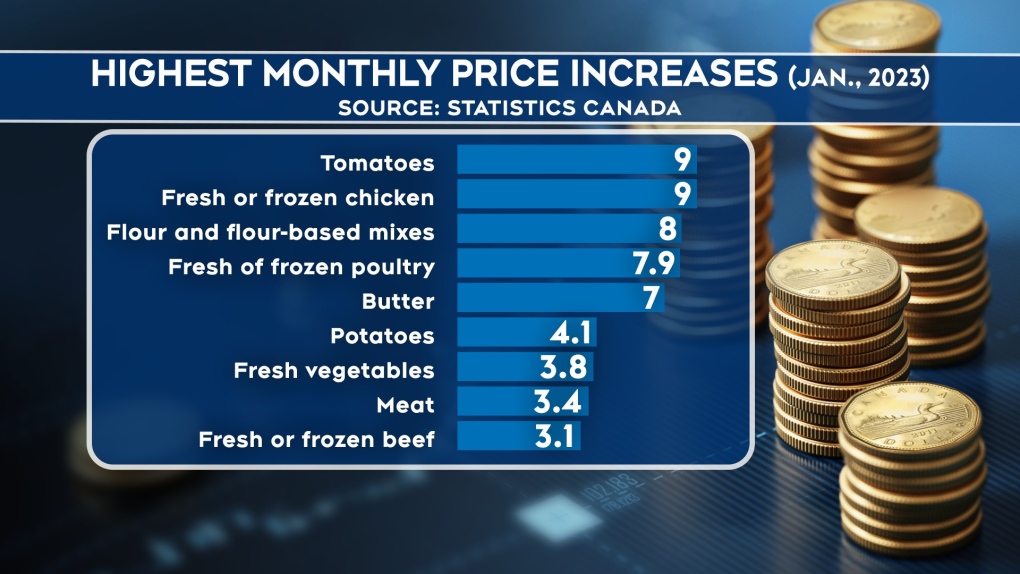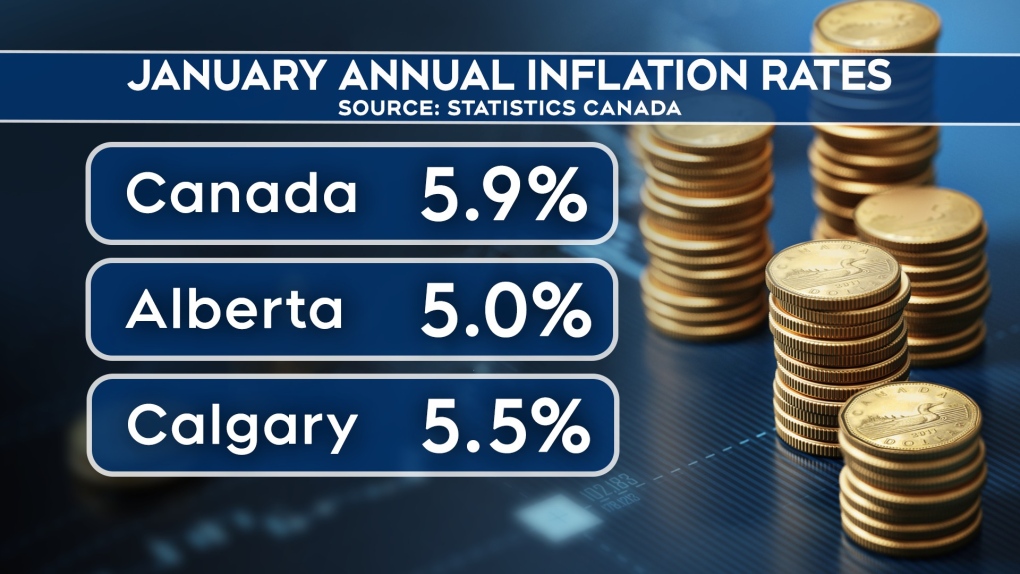Calgarians grapple with high food prices even as overall inflation rate slows
Food prices continue to take a big bite out of household budgets, even as the overall cost of living goes down in Alberta and across the country.
Hilary Martin, who has two young sons, says discount days at the grocery store are crucial.
"Days like today at Save-On, where they have the $1.49, are really important even in this weather, to get out and buy what you can on sale because one grocery stop is $100 easy," she said.
According to Statistics Canada's latest inflation report, food prices went up 11.4 per cent in January, compared to a year ago.

Lettuce alone has gone up 35.3 per cent since last year. Meanwhile, fresh vegetables as a whole went up 14.7 per cent.

From December to January, the price of fresh or frozen chicken increased faster than almost every other grocery item at nine per cent.
Sylvain Charlebois, director of the Agri-Food Analytics Lab at Dalhousie University, says the avian flu, which killed millions of birds on poultry farms in Canada and the U.S., is to blame.
"The avian flu was a big factor out west, impacting egg prices and poultry prices, so we weren't surprised to see higher prices for those two categories specifically," he said.
Charlebois says supply chain disruptions, the war in Ukraine, the cost of fuel and climate change are also driving prices up.
"Our food inflation rate now is higher than the U.S. and Russia," he said.
Charlebois warns things could get worse before they get better.
He cites a significant increase in the cost of dairy and dry foods that we won't see the impact of until Statistics Canada releases its next inflation report in March.
Some Calgarians are changing how they grocery shop due to the high prices.
"We're not getting the quality that we used to get. We're having to go for the less expensive items," said Calgary resident Kerry Smith.
His wife Vicki added, "Often, a lot of the food too is in smaller packages, except higher prices and smaller packages."
Charlebois expects the food inflation rate will start to drop in April or May.
"Supply chains are going to be normalized. Hopefully, the Ukrainian situation won't be as much of a factor and we'll be able to rely on a sound grain deal between Turkiye and Russia, which is not the case right now," he said.
While food prices remain high, Canada's annual inflation rate slowed to 5.9 per cent in January from 6.3 per cent in December.
The last time Canada's inflation rate was below six per cent was in February 2022 when it was 5.7 per cent.
"It's good news but it's still going to be a slow march back to that two per cent target from where we are today," said Rob Roach, deputy chief economist with ATB Financial in Calgary.
Alberta's rate dropped the most out of all the provinces to five per cent.
Calgary's inflation rate is a bit higher at 5.5 per cent.

"When you put it all together, the cost of living and inflation tends to be a little bit higher in urban areas versus the province as a whole," Roach said.
Trevor Tombe, an economics professor at the University of Calgary, did a further breakdown of the numbers in Alberta on Twitter.
He says energy and gas prices have dropped the most, and attributes it, at least in part, to the province's electricity rebates and gas tax cut.
Meanwhile, Martin says even with the overall inflation rate dropping, she will continue to save when and where she can.
"I will always go where the best bargain is," she said.
"In the grand scheme of things, I'm fairly fortunate, but I do know people who are struggling worse."
CTVNews.ca Top Stories

BREAKING Justin Trudeau stepping down as Liberal leader, to stay on as PM for now
Prime Minister Justin Trudeau is stepping down as Liberal leader, and is proroguing Parliament as the Liberal Party of Canada embarks on the journey to replace him.
WATCH LIVE Live updates as Justin Trudeau resigns as Liberal leader
Prime Minister Justin Trudeau has stepped down as Liberal leader. Follow along for live updates from CTVNews.ca.
'2025 is looking good': Elon Musk reacts to Justin Trudeau resignation
After Prime Minister Justin Trudeau resigned from the Liberal party on Monday morning, X owner and Tesla CEO Elon Musk took to social media to comment on the announcement.
Justin Trudeau is resigning, what will be his legacy? A look back at key political eras
In a seismic political move, Justin Trudeau has announced his intention to step down as leader of the Liberal Party of Canada and prime minister, once his successor is named. This decision comes after more than nine years in the country's top job and nearly 12 years at the helm of his party.
W5 INVESTIGATES One Canadian couple's fight against a contractor who defrauded them
Pull into the driveway at John and Julie Ridley's house and you'll notice large patches of red siding are missing from their house and garage. What was supposed to be a dream retirement home for the couple is now a daily reminder of what went wrong.
Winter storm warnings in effect for most of Canada. Here's where
A weekend winter storm that brought much of Canada under severe weather alerts continues to bring chilly conditions to Canadians across the country.
'He won't be a John Doe anymore': OPP use new DNA testing to solve 21-year-old cold case
OPP have used new DNA technology to solve a 21-year-old cold case near Amherstburg, Ont. The new testing has led to the identification of the remains of a man found in 2003.
U.S. Postal Service resumes accepting mail and packages to Canada
The United States Postal Service is resuming accepting mail and packages to Canada following the end to service disruptions from the month-long Canada Post strike.
opinion What you need to know about filing your taxes in 2025
This year, there are several changes to be aware of when filing your 2024 taxes. Personal finance contributor Christopher Liew outlines the key changes to keep in mind as the tax deadline approaches.





















